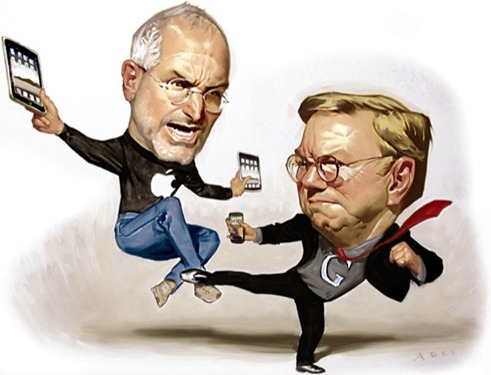After years of cooperation, the two Silicon valley Titans are now converting themselves into Warlords. They seem to be dragger drawn and their rivalry is getting rather personal this time. This cold war between the two giants, has been going on for sometime now, and is slowly converting into into a full fledged battle.
 Image Credit: Daniel Adel from New York Times
Image Credit: Daniel Adel from New York Times
It was after the unveiling of iPad, when Steve Jobs was reported to be quite hostile and critical of Google. From Apple’s Town Hall meeting, some blunt criticisms came from CEO Steve Jobs, which was particularly targeted against Google and Adobe. In the wake of the iPad launch, Jobs opined that the search firm’s motto of "Don’t Be Evil" is simply "bullsh*t" and that the new rival is fully intent on killing the iPhone with its Android despite the companies’ partnership on iPhone services. He similarly explained his position by pointing out that the aggression was largely one-sided and that Apple hadn’t entered enter the Google’s domain, i.e. search. During the meeting, when Jobs was asked by an employee about his thoughts on Google and their competition, Jobs remarked:
We did not enter the search business, they entered the phone business. Make no mistake they want to kill the iPhone. We won’t let them. This don’t be evil mantra: It’s bullshit.
Last year, Google CEO, Eric Schmidt, was pushed off the Apple Board of Directors panel, with following brief announcement by Apple that hardly contained a vote of thanks to the out going Director.
Unfortunately, as Google enters more of Apple’s core businesses, with Android and now Chrome OS, Eric’s effectiveness as an Apple Board member will be significantly diminished, since he will have to recues himself from even larger portions of our meetings due to potential conflicts of interest. Therefore, we have mutually decided that now is the right time for Eric to resign his position on Apple’s Board.
Eric Schmidt, of course, must not be pleased with all these happenings. But on the other hand, the whole issue is based on Jobs’ belief of Schmidt’s betrayal of "picked his pocket" by developing Android powered smartphones that "physically, technologically and spiritually resembled the iPhone". Here’s how this encounter has been described:
At one particularly heated meeting in 2008 on Google’s campus, Mr. Jobs angrily told Google executives that if they deployed a version of multitouch – the popular iPhone feature that allows users to control their devices with flicks of their fingers – he would sue. Two people briefed on the meeting described it as "fierce" and "heated".
One of the critic, Tim Bray, the architect behind XML, who wrote a blog post yesterday announcing his new role as evangelist to software developers for Google’s Android platform, had this to say about competing with Apple:
The iPhone vision of the mobile Internet’s future omits controversy, sex, and freedom, but includes strict limits on who can know what and who can say what. It’s a sterile Disney-fied walled garden surrounded by sharp-toothed lawyers. The people who create the apps serve at the landlord’s pleasure and fear his anger. I hate it.
He further added:
Apple apparently thinks you can have the benefits of the Internet while at the same time controlling what programs can be run and what parts of the stack can be accessed and what developers can say to each other. I think they’re wrong and see this job as a chance to help prove it.
Earlier this month, Apple filed a lawsuit which targeted HTC (the maker of Google Nexus One), for its alleged involvement in infringing 20 patents, related to the iPhone’s user interface, underlying architecture and hardware.
Here is a video from CNBC, discussing this ongoing rivalry between Apple and Google.
So on which side of the fence are you? [via Engadget]
You may also like to check out the comparison between:
You can follow me on twitter or join our facebook fanpage to keep yourself updated on all the latest from Microsoft, Google and Apple.

